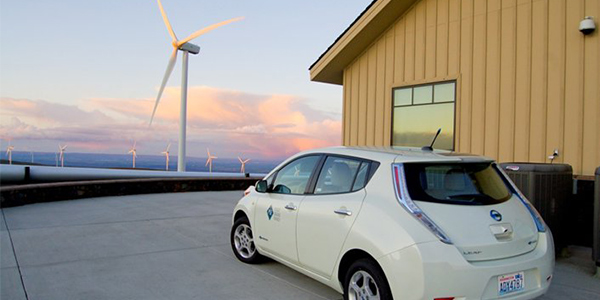As electric cars become more common, fewer drivers will buy gas at the pump, resulting in Washington state collecting less gasoline tax money to spend on roads.
Sen. Rebecca Saldaña (D) has introduced a bill (SB 5444) to tax electric vehicles 2 cents for every mile driven starting July 1, 2026. On Wednesday, the Senate Transportation Committee approved the bill 10-5, sending it to a full Senate vote.
If passed, the bill would bump that tax up to 2.5 cents per mile on July 1, 2029. And the bill would eliminate the current $150 in annual fees EV owners pay to the state, beginning July 1, 2026.
In an interview with NetZero Insider, Saldaña said gasoline tax revenues will inevitably decline as more electric EVs come into use. She said that General Motors plans to produce only EVs by 2035 and that Ford announced last month its European plants will produce only EVs by 2030.
At a Senate Transportation Committee hearing Feb. 18, lobbyist Jim Justin, representing Lyft, said that his business has a goal of net-zero carbon emissions by 2030.
Also at that hearing, Sen. Steve Hobbs (D) said: “Electric vehicles use the same roads as gas vehicles. … Right now, there is a big giant [$150] fee, and no one likes that.” Hobbs co-sponsored Saldaña’s bill and is chairman of the Transportation Committee.
A major difficulty is how the driven miles would be tallied and transmitted to the state government to calculate the tax bills. Saldaña speculated that three methods could be used: transmitters on the vehicles, photos of the odometer sent monthly to the state government and a special software app.
Transportation Committee member Sen. Phil Fortunato (R) opposed the bill: “This can be devastating to farmers with 90% of their driving being on their farms, which would be off [public] roads.”
Two citizens testified against the bill by arguing that heavier EVs that batter highway pavements more should be taxed at a higher rate than tiny electric cars. “Don’t make the odometer a cash register, please,” Ashly Knapp said. “This taxation will hurt EV sales.”
Other testimony on Feb. 18 ranged from neutral to strong support. Supporters focused on the expectation that gasoline tax revenues will drop as more electric cars end up on the road, and a mechanism is needed to make up for the lost revenue. Cities and counties depend on state gasoline taxes to maintain roads. So far, the state government has not nailed down the predicted speed of the growth of EVs.
“We have to do something about the future of our transportation systems,” said Jane Wall, representing the Washington State Association of Counties and County Engineers.



